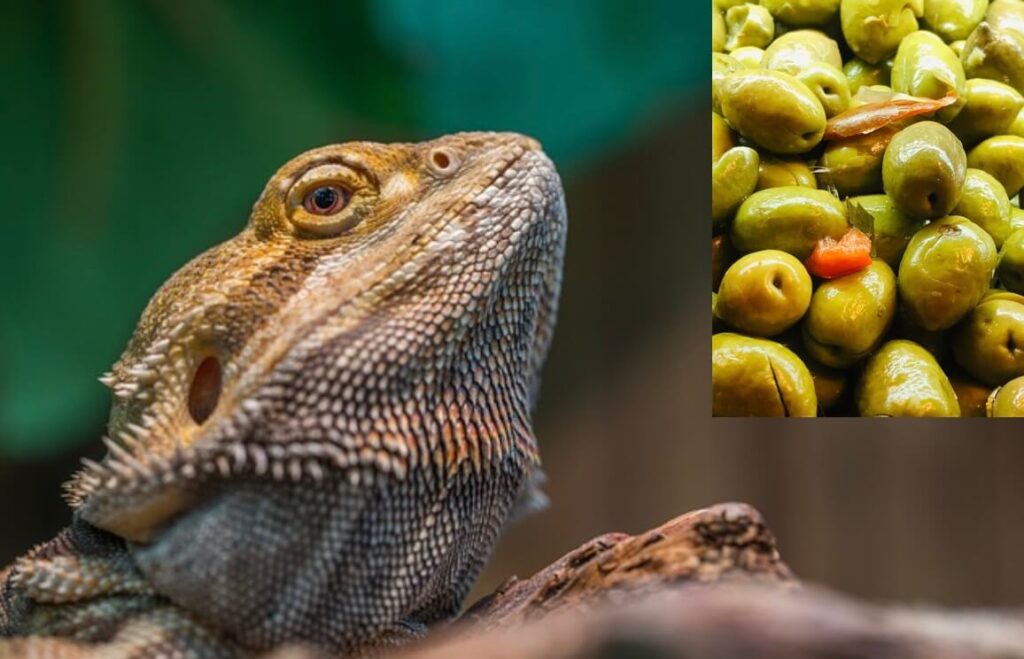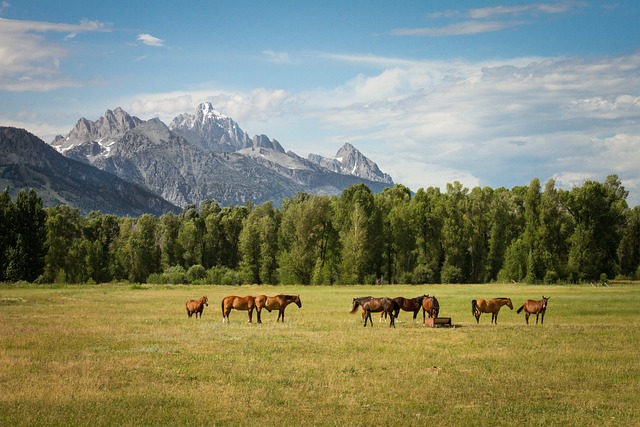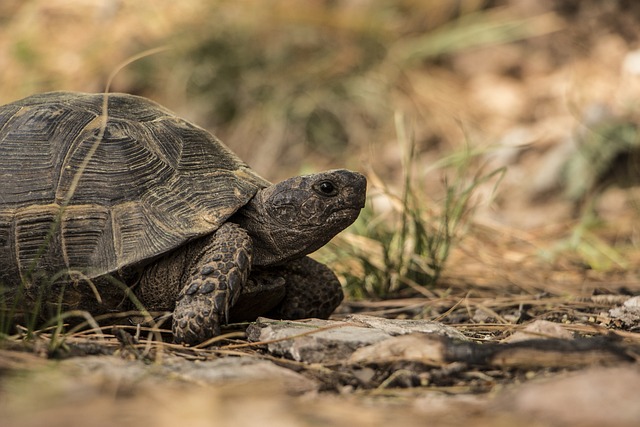If you’re wondering “Can bearded dragons eat olives?,” the answer is a tentative yes. Although bearded dragons can eat small quantities of olives, they should not eat it as a staple in their diet.
In this article, we’ll explore the nutritional value of olives for bearded dragons and how to feed them properly. As well, see our full guide to What greens can bearded dragons eat?
Can bearded dragons eat olives?
- Can bearded dragons eat olives?
- Olive Nutritional Value for Bearded Dragons:
- How often should you give olives to your beardie? Are there potential risks of feeding olives to your bearded dragon?
- How do I prepare olives for my bearded dragon?
- Can bearded dragons have olive oil?
- Frequently Asked Questions (FAQ): Can bearded dragons eat olives?
- Foods bearded dragons can eat:
- Getting your bearded dragon calcium:
- Vegetables to feed your bearded dragon:
- Insects to feed your bearded dragon:
- How often should you feed a bearded dragon?
- What should a bearded dragon not eat?
- Recap: Can bearded dragons have olives?
Olive Nutritional Value for Bearded Dragons:
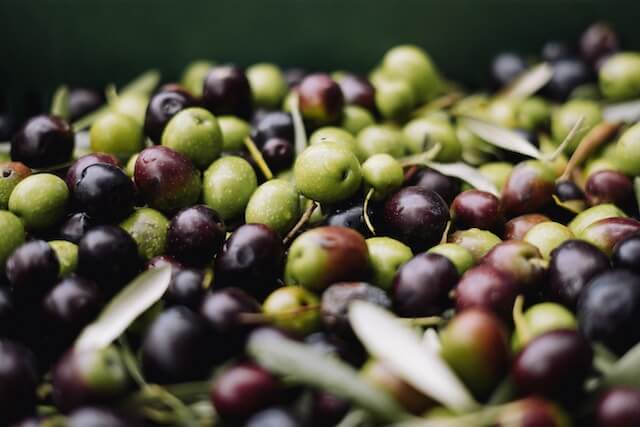
Olives are a wonderful source of nutrients including:
- Fiber (great for bearded dragon’s digestion)
- Calcium (vital for beardie’s growth and bone health)
- Protein
- Carbohydrates
- Vitamin E
- Iron
- Copper
Source: Healthline
How often should you give olives to your beardie? Are there potential risks of feeding olives to your bearded dragon?
It’s best if you give olives to your bearded dragon only on occasion, one olive once a month at the maximum. Why? Olives are quite high in fat and salt, which aren’t good for bearded dragons, who are already prone to obesity and diabetes.
As well, olives aren’t high in calcium and many of the other vitamins that beardies need daily. There are much better vegetables to feed your dragon regularly. More below.
If you were to only feed your beardie olives daily with no other vegetables, they would suffer from a calcium deficiency and over time, it would harm their bone and muscle health.
Note: because of the olive’s low calcium portion, which is vital for bearded dragon health, it’s important to feed them other leafy greens that have more calcium. To be safe, you can also sprinkle calcium powder on your olives to ensure your bearded dragon is getting enough calcium.
How do I prepare olives for my bearded dragon?
Remove the pit from the olive because it’s a choking hazard for them. Cut the olive into smaller bits and sprinkle them into your bearded dragon’s vegetable mix. If they have leftovers, remove them after 24 hours or when it starts to smell off.
Can bearded dragons have olive oil?
No, olive oil is too high in fat and low in calcium to support a healthy bearded dragon.
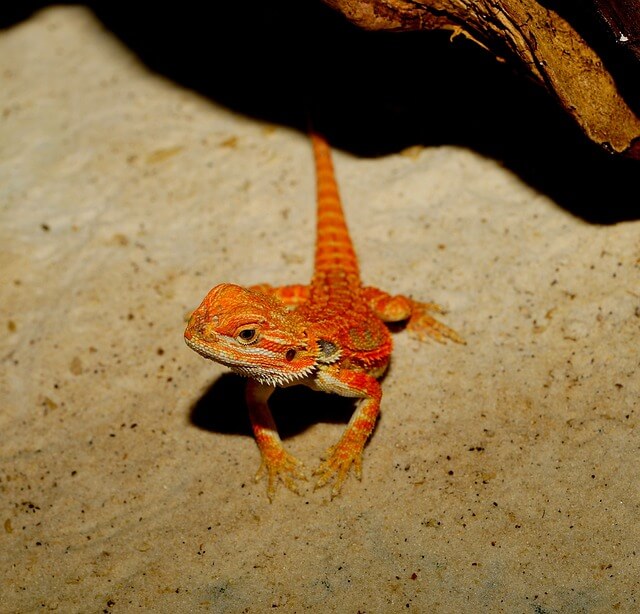
Frequently Asked Questions (FAQ): Can bearded dragons eat olives?
Can bearded dragons eat green olives?
Yes, bearded dragons can eat green olives, in tiny proportions. There is too much fat and salt in them to be eaten more than once a month.
What foods do bearded dragons love most?
Bearded dragon’s favorite food would have to be live bugs, which is typically crickets or roaches.
Can bearded dragons eat cheese?
No, bearded dragons should not eat cheese or dairy or any kind. See our guide to bearded dragons eating cheese here.
Can bearded dragons eat scrambled eggs?
Yes, beardies can safely eat scrambled eggs. Remember not to mix in any additional ingredients that they can’t eat, and not to feed them more than roughly half an egg at a time.
Can Beardies eat steak?
Beardies can eat steak, but make sure it’s unseasoned and cooked. Feed them steak as an emergency food source, as they should stick to their normal diet of insects and plants.
Can bearded dragons eat blackberries?
Yes, bearded dragons can eat blackberries. They should eat one to three blackberries every two weeks at most.
Can bearded dragons eat onions?
No, bearded dragons can not eat onions because they are potentially toxic to their sensitive digestive systems. Onions have far too much acid to be given to bearded dragons safely.
Can bearded dragons eat lettuce?
Yes, bearded dragons can eat lettuce, although it isn’t a great source of daily nutrition for them. It’s best to feed lettuce to them every few days at most.
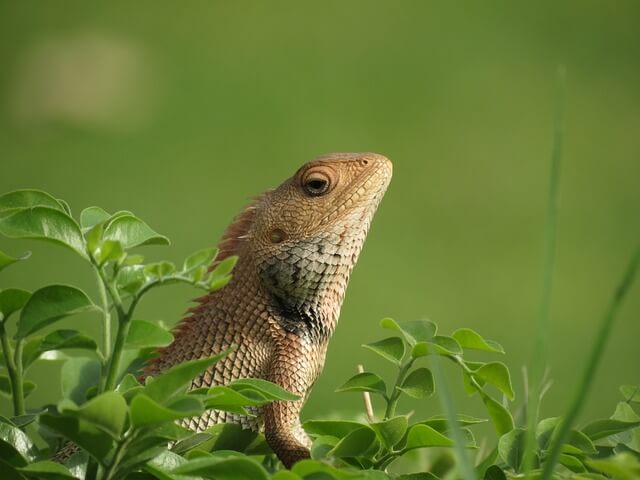
Foods bearded dragons can eat:
If you’re wondering what you should feed a bearded dragon, read our guidelines below. Bearded dragons are insectivores, which just means they thrive on insects as well as plant materials.
If you have a juvenile bearded dragon (between six and eighteen months old), give them about 80% vegetables and 20% live insects.
As your bearded dragon transitions into adulthood, give them the inverse, so 20% plant materials and 80% insects.
Getting your bearded dragon calcium:
Calcium is especially vital to a bearded dragon, especially a young one that is still growing. There are several ways to introduce more calcium into your beardie’s diet:
- Add in more high calcium vegetables like dandelions, bok choy, and collard greens.
- Dust calcium powder over their insects and vegetables to increase calcium levels.
- Make sure they’re getting their 12 hours of UVB exposure as they need this light to be able to properly absorb nutrients.
Vegetables to feed your bearded dragon:
- Peas
- Dandelion
- Green beans
- Cabbage
- Zucchini
- Pumpkin
- See our full list of vegetables to feed your bearded dragon
Note: Bearded dragons can also eat fruit in moderation. See here for a complete list of fruits bearded dragons can eat.
Insects to feed your bearded dragon:
- Crickets
- Kingworms
- Waxworms
- See our full guides to insects you can feed your bearded dragon and worms to feed your bearded dragon
Quick note: Live insects raised by you or bought from the pet store are best because they’re definitely pesticide free.
How often should you feed a bearded dragon?
During the first 3-6 months of your beardie’s life, try to feed them four to five times a day by giving them as many insects as they’d like in 10 minutes. They’re growing and need lots of protein during this stage.
Reduce the number of feedings to about two to three times a day when they’re growing into their juvenile years (between six and eighteen months).
As they become an adult, you can feed them once daily.
What should a bearded dragon not eat?
Avoid feeding your bearded dragon:
- Onions
- Leeks
- Chives
- Mushrooms
- Garlic
- Acidic fruit like oranges, lemons
- Rhubarb (can be toxic to them)
- Avocados (surprisingly, these make them ill)
- Eggplant
- Insects caught in the wild (there may be pesticides covering them)
- Venomous insects
- Dairy of any kind
- Rice and grains of any kind
- Frogs or toads
- Ham or other processed meats
Recap: Can bearded dragons have olives?
- Although bearded dragons can eat olives, they shouldn’t eat it often due to its high fat and low calcium contents.
- Feed them one olive once a month or so, at most.
- You can sprinkle calcium powder on top of your olives to boost your dragon’s calcium intake.
For our full list of food to feed a bearded dragon, see our guide here.
Related articles:

